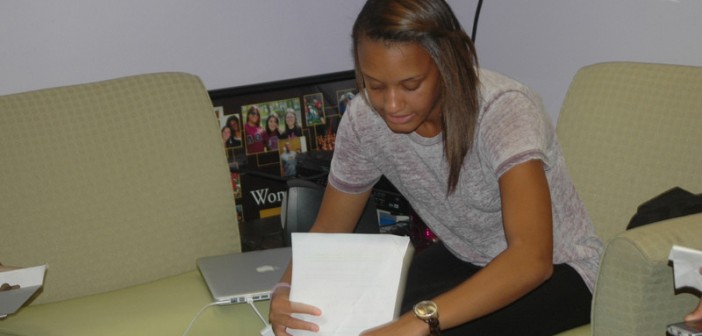In an effort to foster conversations around sexual assault prevention and education at Lehigh, the Women’s Center hosted the “Red Zone” discussion on Friday as a part of the “Are You a Feminist” series.
The series, which focuses on understanding the stereotypes surrounding feminism and the process for eliminating them, was created by Emily Prendergast, ’15, who has worked in the Women’s Center since her first year at Lehigh. Prendergast also led the “Red Zone” session.
“I usually do healthy body image discussions, but now I focus on feminism and how it applies to Lehigh’s campus,” Prendergast said. “I started a discussion series called ‘Are You a Feminist,’ which talks about different issues through a feminist lens.”
To start off the discussion, Prendergast asked the group about their perceptions of feminism and how to break them down.
“What does a feminist actually stand for, and what is the actual definition of a feminist?” she asked the audience.
After discussing the disconnect between the definition of feminism and feminists, and the stereotypes that exist, Prendergast transitioned to a discussion of the “Red Zone.” She defined it as a six-week period when college students arrive on campus when they are most susceptible to sexual assaults and rape. She addressed the audience with a series of questions that gauged their opinion on the existence of the “Red Zone,” the dependency of college students on alcohol and whether or not college students feel as though they need alcohol to facilitate their social interactions.
“I encourage everyone to continue the conversation and reach out to advocates and groups like Break The Silence,” Prendergast said. “Talk to your friends because it needs to be talked about.”
Prendergast said the goal of her discussion series is to eliminate negative stereotypes related to feminism, as well as encourage faculty and students to explore feminism’s true definition. She aims to make the Lehigh community look at various topics through a feminist lens.
Her biggest piece of advice was for any individual who experiences sexual assault on campus to report the incident to the university.
“I went to this particular discussion because of the specific topic of the Red Zone and its impact on Lehigh’s campus,” said Andrea Barker, a university advocate and assistant director of student activities.
Barker also noted the importance of showing support to Lehigh students and the significance of having conversations regarding the “Red Zone” and sexual assault. Barker said these topics are often under-exposed.
“I definitely recommend that students drop in on talks like these,” Barker said. “Discussions such as this one that are student-led are a great way to give everyone a voice and the chance to be heard. I also think these talks provide a great forum for students to share their beliefs and understandings and hear the opposing views of others in a safe environment.”
Barker said she thought Prendergast was effective in facilitating the discussion and believes that students who attended benefited from the dialogue.
“Going to this discussion made me realize an issue we have on Lehigh’s campus that is not being addressed enough,” said Makima Wilkinson, ’16, a member of the Women’s Center staff. “If more students attended the discussion it would bring more awareness on campus, especially for new students.”
Wilkinson also said there are many nationwide programs that Prendergast mentioned that would be beneficial to the Lehigh community and create a university-wide stance on preventing sexual assault.
“Talks like this are so important for our campus because feminism is a word that people shy away from, despite its actual definition for social, economic and political equality for genders,” said Katherine MacLachlan, ’16, president of the Feminist Alliance.
MacLachlan also commended the discussion’s sparking the conversation about equality on campus.
“I’m so glad we are discussing our sexual assault problem on [Lehigh’s] campus too, because it is a problem on every campus,” MacLachlan said. “As long as there are people being assaulted, as long as people don’t know the definition of rape or work to stop assault from occurring, then there is a problem and we need to strive to create that safer environment.”






Comment policy
Comments posted to The Brown and White website are reviewed by a moderator before being approved. Incendiary speech or harassing language, including comments targeted at individuals, may be deemed unacceptable and not published. Spam and other soliciting will also be declined.
The Brown and White also reserves the right to not publish entirely anonymous comments.